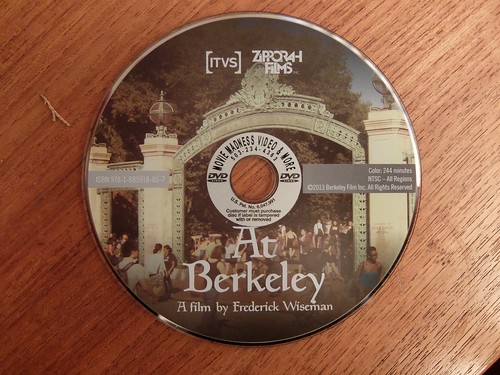I wasn't sure what to expect when grabbing this DVD, along with the Okinawa one, at Movie Madness. I thought maybe I'd get a trip down memory lane to scenes of student protests in the face of shows of state authority. There's little if any archival footage of that variety. The film is tightly focused on the present.
The central theme is the university's mission, to nurture California's public, which includes people from all walks of life, in the face of where the money is coming from to sustain operations. The State of California has not kept up with Berkeley's explosive growth and no longer provides upwards of 40% of the funds. The research side of the business has been fueling more of the budget, but comes with its own set of priorities.
The filmmaker's approach is to have students share directly, to each other, in class, and for the camera, regarding public policy, while having administrators do the same, in meetings. Lets hear the voices of Berkeley as it figures out, as an institution, how best to roll forward.
From the student point of view, tuition has become an increasing chunk of change, with financial aid yielding student loans and scholarships. Tuition is no longer free to qualified residents, as it is in some developing countries.
In fairness to the State of California, other outlets exist for spreading opportunity outside of funding a state university system. Professional development, on the job training, as well as re-training, give people a boost, sometimes in a more focused way than do giant universities.
Students do stage a protest / walkout in this film, taking over the library. This is one of the ways people make change happen, by staging events showcasing the passion and energy behind some cause or demand. The general public understands "ceding to demands" and so the narrative moves forward.
Watching this back-to-back with Okinawa: The Afterburn was interesting, as a segment of the film focused on vets coming into the university system from the base system. They come in with higher rank, further ahead than freshmen, and like some other ethnic minorities find themselves under the gun to perform in ways they've not had to before. The challenge comes down more to the individual than to one's company or battalion. Some sense an existential threat, others discover community in other vets.
How to make learning life-long, as well as on-line is the challenge of the 21st Century. We need to see the base system (the military) as an educational endeavor, competing for public funding and attention with public universities, if we wish to see the greater public policy picture. None of the discourse in this film is that zoomed out. Base network military socialism, governed by a top-down command structure, is not intended to be democratic, though may coexist with democracies at least in theory (the USA was such an experiment).
The central theme is the university's mission, to nurture California's public, which includes people from all walks of life, in the face of where the money is coming from to sustain operations. The State of California has not kept up with Berkeley's explosive growth and no longer provides upwards of 40% of the funds. The research side of the business has been fueling more of the budget, but comes with its own set of priorities.
The filmmaker's approach is to have students share directly, to each other, in class, and for the camera, regarding public policy, while having administrators do the same, in meetings. Lets hear the voices of Berkeley as it figures out, as an institution, how best to roll forward.
From the student point of view, tuition has become an increasing chunk of change, with financial aid yielding student loans and scholarships. Tuition is no longer free to qualified residents, as it is in some developing countries.
In fairness to the State of California, other outlets exist for spreading opportunity outside of funding a state university system. Professional development, on the job training, as well as re-training, give people a boost, sometimes in a more focused way than do giant universities.
Students do stage a protest / walkout in this film, taking over the library. This is one of the ways people make change happen, by staging events showcasing the passion and energy behind some cause or demand. The general public understands "ceding to demands" and so the narrative moves forward.
Watching this back-to-back with Okinawa: The Afterburn was interesting, as a segment of the film focused on vets coming into the university system from the base system. They come in with higher rank, further ahead than freshmen, and like some other ethnic minorities find themselves under the gun to perform in ways they've not had to before. The challenge comes down more to the individual than to one's company or battalion. Some sense an existential threat, others discover community in other vets.
How to make learning life-long, as well as on-line is the challenge of the 21st Century. We need to see the base system (the military) as an educational endeavor, competing for public funding and attention with public universities, if we wish to see the greater public policy picture. None of the discourse in this film is that zoomed out. Base network military socialism, governed by a top-down command structure, is not intended to be democratic, though may coexist with democracies at least in theory (the USA was such an experiment).

